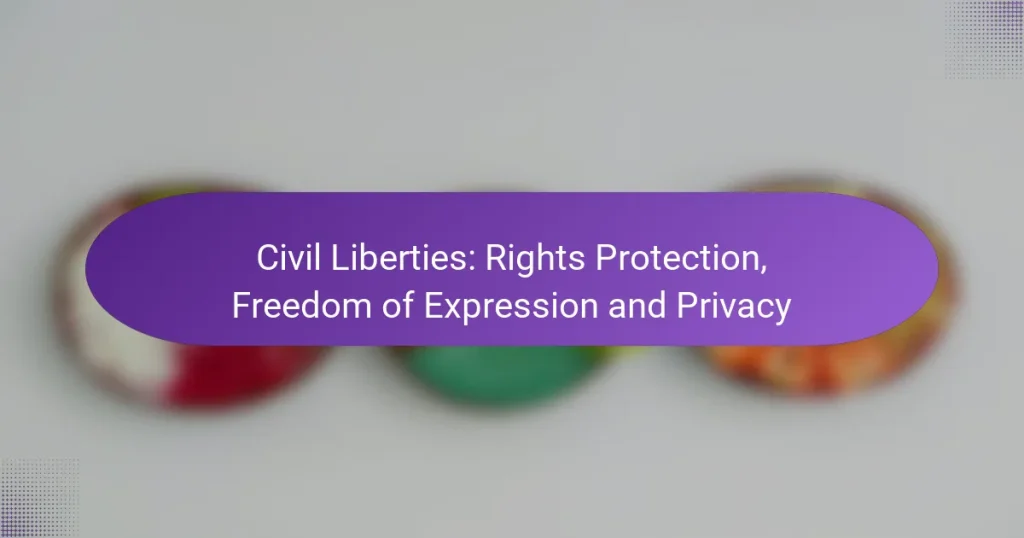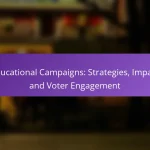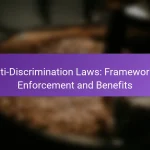Civil liberties in the United States are essential protections enshrined in the Constitution, particularly through the Bill of Rights, which safeguards fundamental rights like freedom of expression and privacy. These rights enable individuals to communicate freely and maintain control over their personal information, forming the backbone of a democratic society. Judicial review and legislative measures play a crucial role in enforcing these liberties against governmental overreach.
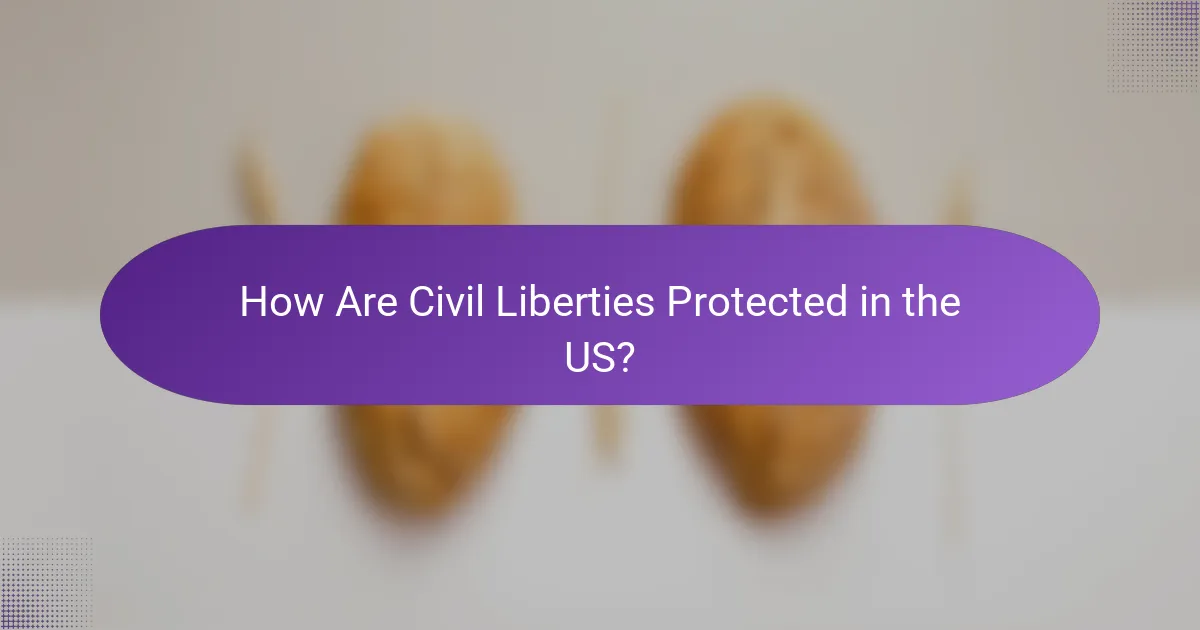
How Are Civil Liberties Protected in the US?
Civil liberties in the United States are primarily protected through the Constitution, particularly the Bill of Rights, which guarantees fundamental rights such as freedom of speech and privacy. These protections are enforced through judicial review and legislative measures that aim to uphold individual freedoms against government infringement.
Constitutional Amendments
The Bill of Rights, consisting of the first ten amendments to the Constitution, explicitly outlines various civil liberties. Key amendments include the First Amendment, which protects freedom of speech, religion, and assembly, and the Fourth Amendment, which guards against unreasonable searches and seizures.
Additional amendments, such as the Fifth and Sixth, ensure rights related to due process and fair trials. These amendments form the foundation of civil liberties, providing a legal framework that individuals can rely on to challenge government actions.
Judicial Review
Judicial review is the process by which courts interpret the Constitution and assess the legality of legislative and executive actions. This mechanism allows courts to strike down laws or actions that violate civil liberties, ensuring that individual rights are upheld.
Landmark Supreme Court cases, such as Brown v. Board of Education and Roe v. Wade, illustrate how judicial review has been used to expand and protect civil liberties. Citizens can challenge laws in court, making judicial review a critical tool for safeguarding rights.
Legislative Framework
Congress has enacted various laws to protect civil liberties, including the Civil Rights Act and the Freedom of Information Act. These laws provide mechanisms for individuals to seek redress and promote transparency in government actions.
Legislation often complements constitutional protections by addressing specific issues, such as discrimination or privacy rights. Understanding these laws can empower individuals to advocate for their rights and hold government entities accountable.
Non-Governmental Organizations
Non-governmental organizations (NGOs) play a vital role in protecting civil liberties by advocating for individual rights and raising public awareness. Organizations like the American Civil Liberties Union (ACLU) and Human Rights Watch work to defend freedoms through litigation, education, and policy reform.
These NGOs often provide resources and support for individuals facing civil liberties violations, helping them navigate legal challenges. Engaging with these organizations can enhance public understanding and support for civil liberties initiatives.
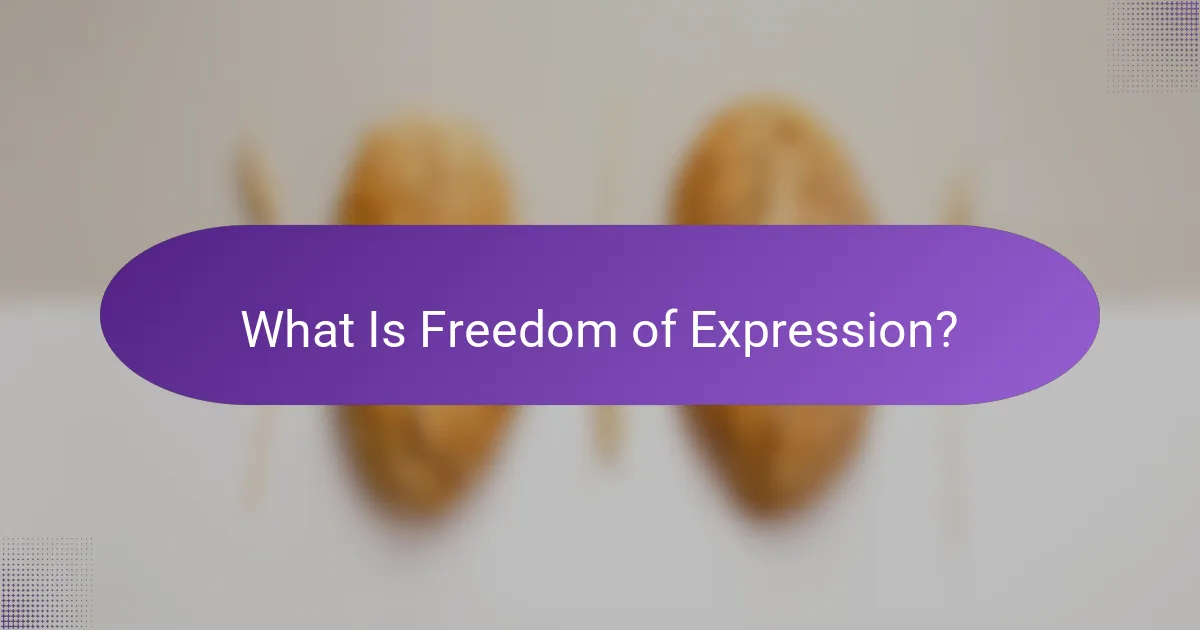
What Is Freedom of Expression?
Freedom of expression is the right to express one’s thoughts, opinions, and beliefs without censorship or restraint. This fundamental liberty is essential for a democratic society, allowing individuals to communicate freely and engage in open dialogue.
Definition and Scope
Freedom of expression encompasses various forms of communication, including spoken and written words, art, and digital media. It allows individuals to share ideas, criticize the government, and participate in public discourse. The scope of this freedom varies by country, influenced by cultural norms and legal frameworks.
In many democratic nations, freedom of expression is protected under constitutional law, but its interpretation can differ significantly. For example, the United States provides robust protections under the First Amendment, while European countries may impose certain restrictions to balance this right with other societal interests.
Legal Protections
Legal protections for freedom of expression are established through national constitutions, international treaties, and judicial rulings. In the U.S., the First Amendment protects individuals from government censorship, while the European Convention on Human Rights guarantees this freedom with certain limitations.
Organizations like the United Nations advocate for freedom of expression as a human right, encouraging countries to adopt laws that safeguard this liberty. Countries may also have specific laws addressing hate speech, defamation, and incitement to violence, which can impact how freedom of expression is exercised.
Limitations and Exceptions
While freedom of expression is a fundamental right, it is not absolute. Limitations often exist to protect public order, national security, and the rights of others. For instance, many jurisdictions prohibit hate speech, which can incite violence or discrimination against specific groups.
Common exceptions to freedom of expression include restrictions on speech that promotes terrorism, obscenity, or false statements that can harm individuals or the public. Understanding these limitations is crucial for individuals to navigate their rights responsibly and avoid legal repercussions.
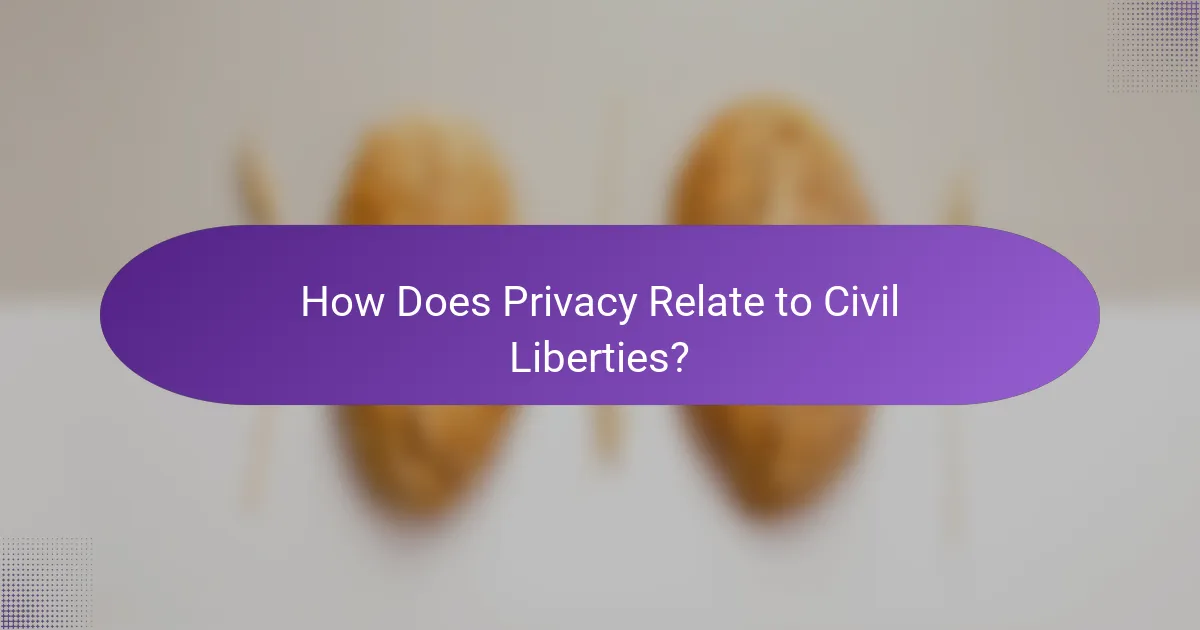
How Does Privacy Relate to Civil Liberties?
Privacy is a fundamental aspect of civil liberties, protecting individuals from unwarranted intrusion by the state or other entities. It encompasses the right to control personal information and maintain autonomy over one’s private life.
Legal Standards for Privacy
Legal standards for privacy vary by country but generally include constitutional protections, statutory laws, and international agreements. In the United States, for example, privacy rights are derived from the Fourth Amendment, which guards against unreasonable searches and seizures.
In the European Union, the General Data Protection Regulation (GDPR) sets stringent rules on data protection and privacy, emphasizing the importance of consent and transparency. Understanding these legal frameworks is crucial for individuals and organizations to ensure compliance and protect personal data.
Impact of Technology on Privacy
Technology significantly impacts privacy by enabling both enhanced communication and increased surveillance. Devices such as smartphones and smart home systems collect vast amounts of personal data, often without users fully realizing it.
Moreover, social media platforms can expose personal information to a wide audience, raising concerns about data security and privacy breaches. Individuals should be aware of privacy settings and data-sharing policies to mitigate risks associated with technology.
Privacy Rights in the Digital Age
In the digital age, privacy rights are increasingly challenged by the proliferation of online data collection and surveillance practices. Users often face trade-offs between convenience and privacy, as many services require personal information for access.
To safeguard privacy rights, individuals should adopt practices such as using strong passwords, enabling two-factor authentication, and being cautious about the information shared online. Staying informed about privacy laws and advocating for stronger protections can also help in maintaining personal privacy in a rapidly evolving digital landscape.
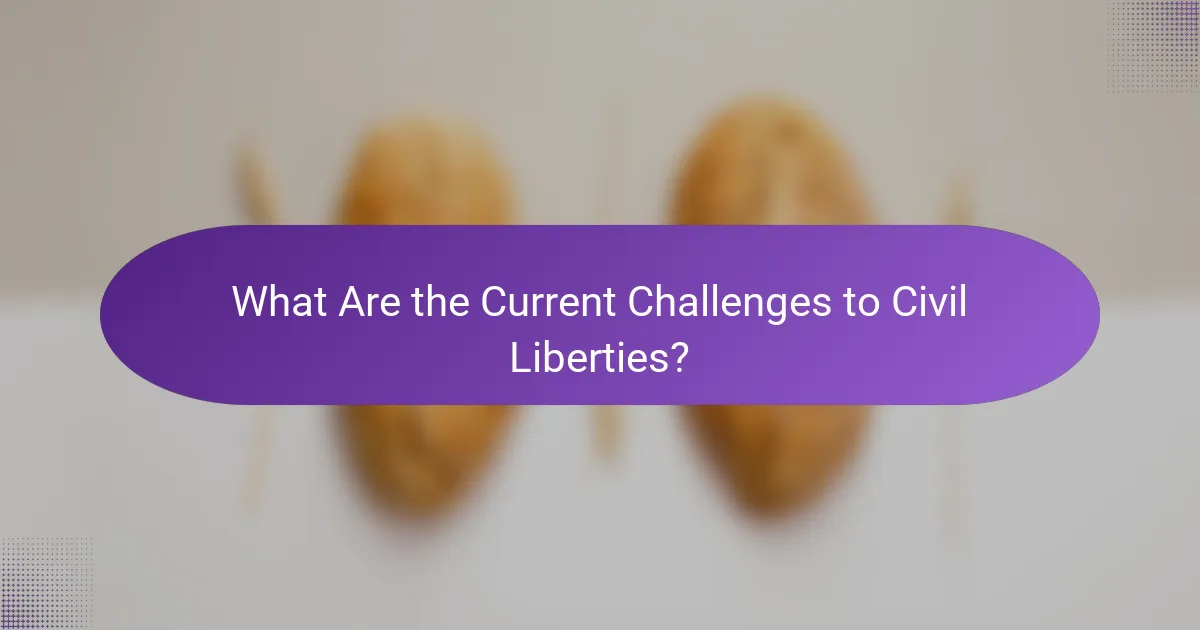
What Are the Current Challenges to Civil Liberties?
Current challenges to civil liberties include government surveillance, hate speech regulations, and data protection issues. These challenges can significantly impact individual rights, freedom of expression, and privacy in various ways.
Government Surveillance
Government surveillance refers to the monitoring of individuals’ activities and communications by state authorities. This practice often raises concerns about privacy and the potential for abuse of power, especially when it occurs without adequate oversight.
In many countries, surveillance programs have expanded significantly, often justified by national security needs. Citizens should be aware of the extent of these programs and the legal frameworks that govern them, such as the USA PATRIOT Act in the United States or the Investigatory Powers Act in the United Kingdom.
Hate Speech Regulations
Hate speech regulations aim to limit expressions that incite violence or discrimination against particular groups. While these laws are intended to protect vulnerable populations, they can also lead to tensions regarding freedom of expression.
Different countries have varying definitions and enforcement of hate speech laws. For instance, the European Union has stricter regulations compared to the United States, where hate speech is largely protected under the First Amendment. Individuals should understand their local laws to navigate these complexities effectively.
Data Protection Issues
Data protection issues arise from the collection, storage, and use of personal information by organizations and governments. With the rise of digital technology, concerns about how data is handled and the rights of individuals to control their information have become paramount.
Regulations like the General Data Protection Regulation (GDPR) in the EU set strict guidelines for data usage, emphasizing consent and transparency. Individuals should be proactive in understanding their rights under such regulations and take steps to safeguard their personal data, such as using strong passwords and being cautious about sharing information online.
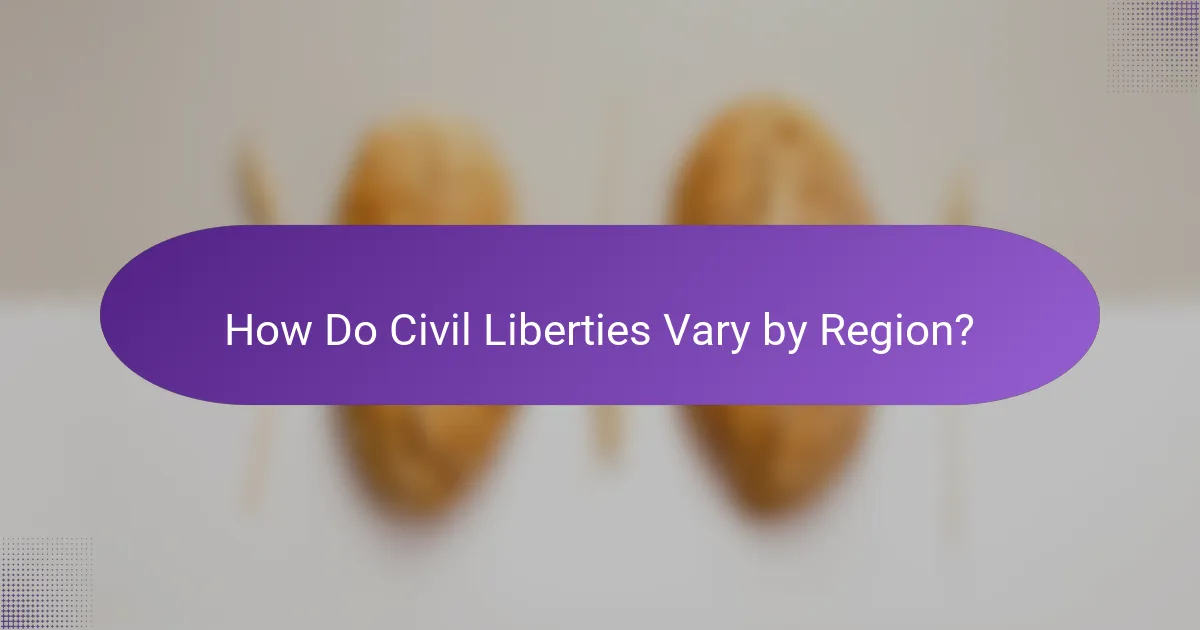
How Do Civil Liberties Vary by Region?
Civil liberties differ significantly across regions, influenced by cultural, legal, and political factors. These variations can impact rights such as freedom of expression, privacy protections, and the overall enforcement of individual rights.
Comparative Analysis of Civil Liberties
In general, civil liberties are more robust in democratic nations, where legal frameworks support individual rights. For instance, countries in Western Europe often have strong protections for freedom of expression and privacy, backed by laws like the General Data Protection Regulation (GDPR).
Conversely, in regions with authoritarian regimes, civil liberties may be severely restricted. In such areas, freedom of speech can be limited, and privacy rights may be compromised through surveillance and censorship.
Case Studies: Europe vs. US
In Europe, civil liberties are often viewed through the lens of collective rights, emphasizing social welfare alongside individual freedoms. The European Convention on Human Rights provides a strong legal basis for protecting these liberties, ensuring that member states uphold fundamental rights.
In the United States, civil liberties are primarily enshrined in the Bill of Rights, which emphasizes individual freedoms like speech and religion. However, the interpretation of these rights can vary significantly, leading to ongoing debates about privacy, especially in the context of technology and surveillance.
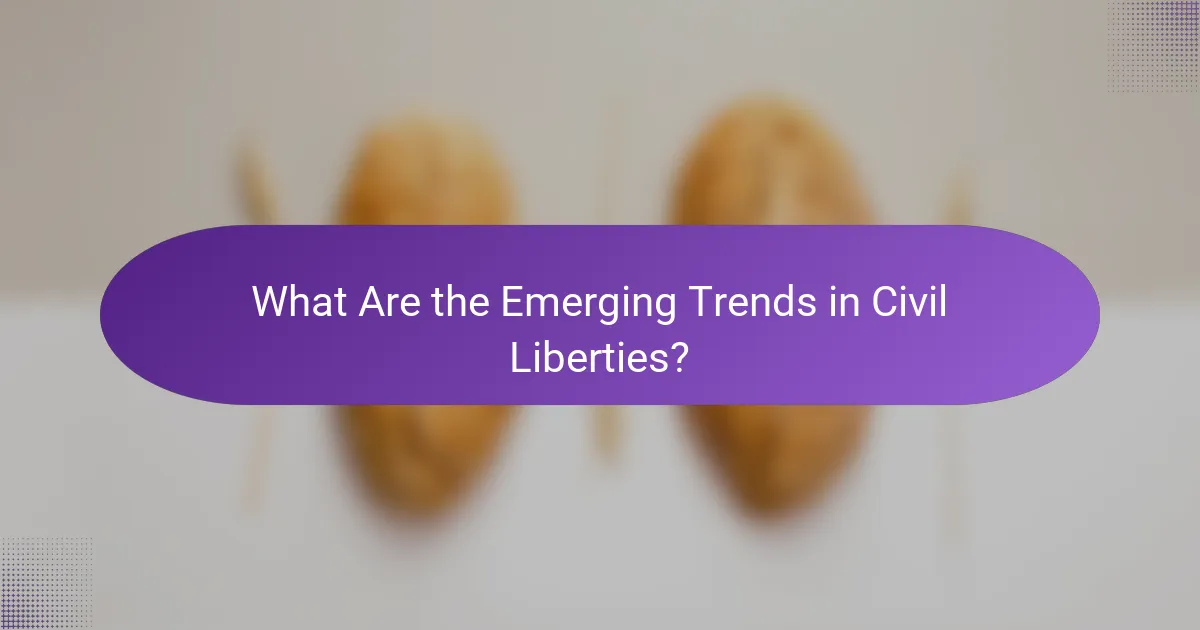
What Are the Emerging Trends in Civil Liberties?
Emerging trends in civil liberties reflect the evolving landscape of rights protection, particularly concerning freedom of expression and privacy. Key developments include the impact of technology, particularly social media, and the growing emphasis on digital privacy rights.
Impact of Social Media
Social media platforms significantly influence civil liberties by shaping public discourse and enabling widespread communication. They provide a space for individuals to express opinions, but they also raise concerns regarding censorship and misinformation.
Users often face challenges related to privacy and data security, as personal information can be harvested and misused. It’s essential for individuals to understand platform policies and take proactive steps to protect their data, such as adjusting privacy settings and being cautious about the information they share.
Moreover, governments may impose regulations on social media to combat hate speech or misinformation, which can lead to tensions between maintaining free expression and ensuring public safety. Users should stay informed about local laws and platform guidelines to navigate these complexities effectively.
